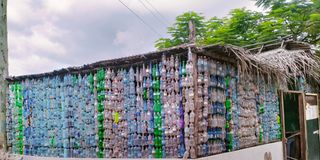Plastic waste finds new life in restaurants

A section of the Pate Recycled Plastics Hotel. Such projects have helped reduce plastic pollution in the ocean by over 70 per cent.
What you need to know:
- In Pate Island, Lamu East Sub-county, such projects have reduced plastic waste accumulation by over 70 per cent since their inception three years ago.
After successfully building a boat out of plastic, islanders in the Lamu archipelago have now embraced other plastic recycling projects, including the construction of hotels, restaurants, resting structures, recreational platforms and rentals using plastic waste materials from the ocean.
The move is aimed at protecting the marine ecosystems.

Mohamed Hassan, one of the proprietors of Pate Recycled Plastic Hotel and Restaurant, during the interview.
For instance, in Pate Island, Lamu East Sub-county, such projects have reduced plastic waste accumulation by over 70 per cent since their inception three years ago.
Launched in early 2022, the projects have proven successful in fighting plastic pollution, according to environmentalists and the community at large.
Mohamed Hassan, one of the proprietors of the Pate Recycled Plastic Restaurant, said they came up with the idea of using plastic bottles because they had become an eyesore after accumulation on the beach and dumpsites.
“We had to draft a plastic waste recycling plan to control the worrying situation. By then, plastics, especially bottles, were almost everywhere - on the seafront, beaches and in the ocean. Initially, we used to pay children between Sh10 and Sh20 to bring us a kilo of plastic bottles. We had our specific garbage collection point,” said Mr Hassan.
After gathering about 6,000 plastic bottles, they started constructing the now famous Pate Recycled Plastic Restaurant.
“After the community saw the idea, it was touched, prompting members to embrace it immediately. Children and adults would bring us kilos and kilos of plastic bottles free of charge. Today, the project has borne fruit. It’s not easy to move around and see plastics disposed of carelessly. Our target is to have an environment free of plastics,” said Mr Hassan.
Haji Ramadhan, a member of the Pate Resources and Tourism Initiative, a community and youth-led organisation dealing with conservation-related activities, cited the Recycled Plastic Bottles Restaurant in Pate Island as one of the success stories of the group in as far as campaigns against plastic pollution are concerned in the county.
“Our aim is to ensure there is zero plastic pollution in our ocean and the environment at large; and I think we are headed in the right direction,” said Mr Ramadhan.
Husna Bakari, a conservationist in Lamu East, said the ongoing plastic recycling projects have so far influenced many to embark on such initiatives.
Ms Bakari said women, children and the elderly in Pate, Faza, Mkokoni, Kiwayu, Lamu Island, Shella and surrounding areas of the archipelago have in recent years been known to set particular dates when they go round the beaches to collect the plastics and assemble them in one place before preparing them for use in the construction of houses, hotels, restaurants and other joints.
This has left many beaches in Lamu clean.
Apart from Pate, other areas where you will find recycled plastic projects include Mkokoni, Faza, Kiwayu, Shella, Kipungani, Matondoni, Lamu Island and the Wiyoni beaches.
“We thank Allah (God) for making us come up with such unique ideas to recycle plastics. This has ensured no plastics roam our beaches. Nowadays most beaches here are sparkling clean,” said Ms Bakari.
Other than boosting tourism numbers and boosting the cleanliness of the beaches, such initiatives have also provided a conducive breeding ground for turtles.
“Clean beaches are suitable grounds for nesting by turtles. We have experienced this first-hand here in Pate, Mkokoni and Mwongo-Sharif Island. Since we started this initiative, many beaches have become major nesting sites for the turtles,” said Twaha Ahmed, an environmentalist.
It is worth noting that in 2018, Lamu made history after it launched the first-ever Flip-Flopi, a dhow made entirely from recycled marine plastic, the world’s first.
The Flip Flopi dhow was launched on a day when the world was celebrating World’s Beach Cleanup Day, on September 15, 2018.
The dhow now serves to reinforce the need for people to maintain cleanliness on the various beaches in Kenya and the world.
In August 2017, the Kenyan government outlawed single-use plastic bags as a key step towards environmental conservation and protection.





